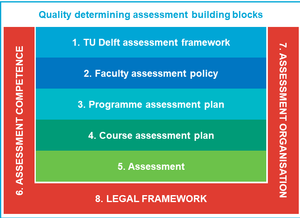Introduction and Summary
It is important that graduates of the TU Delft sufficiently master the final attainments of their degree programme to be meaningful for their professional life (civil effect). The final attainment levels are measured by a set of assessments. Therefore, good quality of assessments is crucial.
Definition
An assessment is an educational activity during which individual students demonstrate how well they master the learning objectives of a course, and during which their performance is measured. This information is shared with students to steer and/or evaluate their learning. Disambiguation of assessment terms can be found in section 3.1 and in the glossary in F.1.
Context
In order to have good quality assessments, the Executive Board, together with different stakeholders, has defined this ‘TU Delft Assessment Framework 2023-2028’. In defining this framework we have taken both external requirements (e.g. from the Higher Education and Research Act1) as well as TU Delft agreements (e.g. Model Teaching and Examination Regulations2, TU Delft Vision on Education3) into account.
Assessment building blocks that determine assessment quality
The TU Delft assessment is of good quality if all assessment aspects (assessment building blocks, see Figure 1) are of good quality and consistent with each other.
Assessment quality entails the quality and consistency of the following building blocks: 1) TU Delft assessment framework, 2) the faculties’ assessment policies, 3) the BSc’s and MSc’s programmes’ assessment plan, 4) the courses’ assessment plans, 5) the assessments itself, supported by 6) assessment competence, 7) the assessment organisation, and 8) the compliance with the legal framework. Adapted from the assessment web4.
The first five building blocks of assessmenta (see Figure 1) form a logical order from central to assessment level:
- TU Delft assessment framework
- Faculty assessment policy
- Programme assessment plan
- Course assessment plan
- Assessment
The final three building blocks are important at all levels, which they support.
- Assessment competence (of everybody with an assessment task)
- Assessment organisation (on all levels)
- Legal framework (on all levels)
Chapter 6 and Appendix D.1 indicate on a general level who is accountable, responsible, consulted and informed on what building block.
Topics
The TU Delft Assessment Framework 2023-2028 contains the following topics:
- Vision on assessment (chapter 2, building block 1): an overview of the assessment values and guidelines that form the backbone for the decisions that the TU Delft makes on assessment.
- Legal framework (chapter 2, building block 8): an overview of documents that have led to and follow from this assessment framework.
- TU Delft assessment agreements (chapter 3, building block 1 and 8): an overview of TU Delft wide agreements on assessment and their sources, which is or will be operationalised in the faculties’ assessment policies and/or other documents.
Next to these three chapters that describe TU Delft agreements, the following three chapters indicate how the TU Delft facilitates assessment quality:
- Assessment policies in the faculty (chapter 4, building block 2, 3, 4 and 6): an overview of how faculties ensure assessment quality through the faculty’s assessment policy, the programme’s assessment plan, and the course’s assessment plan.
- Assessment organisation (chapter 5, building block 7): an overview of who is responsible for relevant assessment tasks.
- Assessment competence (chapter 6, building block 6): an overview of how the TU Delft ensures that assessment stakeholders have sufficient assessment competence. This includes an overview on how the agreements in the first two chapters are operationalised.
In addition:
- Appendix F gives an overview of the assessment-related terminology and abbreviations.
Reading guide
Table 1 suggests per function type what the most relevant parts of the assessment framework are.
Scope
This TU Delft framework provides all people involved with assessments in TU Delft BSc and MSc courses with a vision on assessment, and it defines the TU Delft agreements and conditions concerning these assessments. Faculties will make sure their assessment policy and programme assessment plans will be aligned with this ‘TU Delft Assessment Framework’ and the resulting conditions that are summarized below per assessment building block (and chronologically in A.1). Interfaculty programmes, programmes that are joint degrees with other universities, and programmes that face specific national requirements can encounter conflicting policies. The same holds for service courses and free electives. In these cases, programmes (and courses) make an informed decision on what policy to follow.
Conditions for good quality assessment per building block
Below, the conditions that are necessary to ensure good quality assessment are listed per building block. The conditions are numbered in the order in which they appear in chapter 1-6. Symbols below the condition number indicate whether the responsibility is central ( ), at faculty level (
), at faculty level ( ), or both (
), or both ( ). Click on a condition to go to the part of the framework that discusses this condition.
). Click on a condition to go to the part of the framework that discusses this condition.
Revisions of the assessment framework
Finally, since this is the first time the assessment framework has been published in this form, the Assessment Framework 2023-2028 will be revised a year after its publication based on feedback from stakeholders and changes in underlying documents. Therefore, feedback is more than welcome and can be sent to assessment-taskforce-esa@tudelft.nl.
Apart from yearly corrections and minor updates based on changes in the legal framework and newly developed or adapted TU Delft policies, a more thorough revision of the assessment framework will take place at least every six years.
a ‘Assessment building blocks’ are also called ‘entities’4, ‘pyramid layers’5, ‘building blocks’6 in different sources. Since we are a technical university, ‘building blocks’ seems fitting. The building blocks are adapted from the assessment web4.
), at faculty level (
), or both (
). Click on a condition to go to the part of the framework that discusses this condition.







